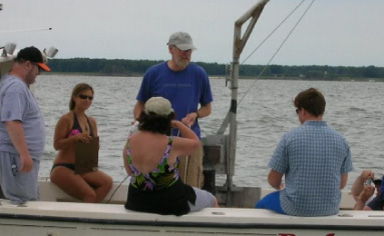Studies of biogeochemical processes and ecological food webs represent research approaches that are applicable anywhere. The global scale focus on carbon and nitrogen cycling gives Chesapeake Bay research a global relevance, revealing how humans have influenced coastal systems around the world by the inadvertent release of nutrients and other contaminants.
Many regions around the world are experiencing hypoxia and eutrophication. Dead zones are a global problem with regional manifestations. For Michael, knowing that something he has done in the developed world is being applied in less developed regions is meaningful, allowing him to use his involvement in science to help solve real-world problems.
|



